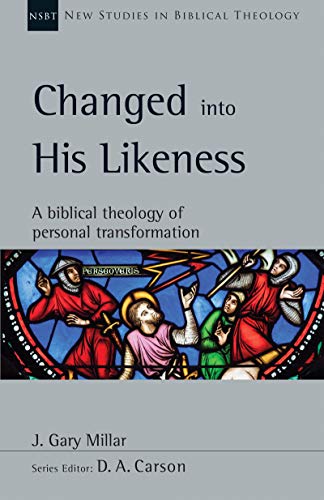A Brief Book Review from Books At a Glance
by Mark Baker
Gary Millar is no stranger to the New Studies in Biblical Theology Series. He previously contributed two volumes, Now Choose Life and Calling on the Name of the Lord to the series. Building on David Peterson’s seminal work, Possessed by God, Changed into His Likeness seeks to provide a biblical theology of personal transformation. For Peterson, when the New Testament uses sanctification language, it most often refers to positional sanctification. While Millar agrees with Peterson’s findings, he seeks to analyze sanctification on a more conceptual level, which emphasizes the progressive nature of sanctification.
Millar defines personal transformation as “decisively altered behavior, consistently modified thinking, choices and decisions and permanently reshaped character” (4). Millar rightly observes that personal transformation does not result in perfection but change. He aptly threads the needle between arguments for too much change and not enough change, crafting an appealing and pastorally sensitive definition of transformation. Millar employs responsible research methods and does not fall into the temptation of building theological definitions on lexical evidence alone. His treatment of anthropology in chapter 2 was especially insightful, where he argues that “the biblical character presents itself to us more as parts than as a whole” (48). This can be called a “Christian Aristotelian Platonism” or, in more plain language, “biblical common sense” (54).
Millar’s most unique contribution is found in chapter 3, where he argues that true personal transformation does not occur in the lives of Old Testament saints. Millar posits that personal transformation is one of the benefits of the new covenant that is only realized in the NT (e.g., p.122). It’s a bold proposal, and Millar devotes 67 pages to defending it, providing multiple case studies such as Noah, Moses, and David. For Millar, their end-of-life failures reveal their lack of true, long-term transformation. Similarly, even OT stories of conversions such as Rahab show a “decided lack of interest in moral or spiritual development in the long term” (88). While I appreciate the effort to observe warranted discontinuity between old and new covenants, Millar’s argument here weighs too heavily on silence and ultimately fails to convince.
The rest of the book develops a positive exposition of personal transformation, beginning with the New Testament (chapter 4), then a helpful survey from church history (chapter 5), and finally a 20-page overview of a biblical theology of transformation (chapter 6). Readers will find much to glean in these sections. There are indeed legitimate differences between Old Testament and New Testament saints, and Millar serves as a faithful expositor of the Scriptures and insightful guide through the Great Tradition (chapter 5 was particularly insightful). There were several parts in these chapters that could have included extra support. I often found myself in general agreement but also wanted to know more. While readers will probably not agree wholesale with Millar’s argument, Changed into His Likeness succeeds in its goal of furthering the study of sanctification by looking at the important aspect of personal transformation. You will certainly benefit from reading this book, whether you are a pastor, counselor, or interested in going deeper in discipleship and personal transformation.
Mark Baker (PhD, Southeastern Baptist Theological Seminary) serves as director of the Heart of Texas Foundation | College of Ministry, located in Houston, TX.
